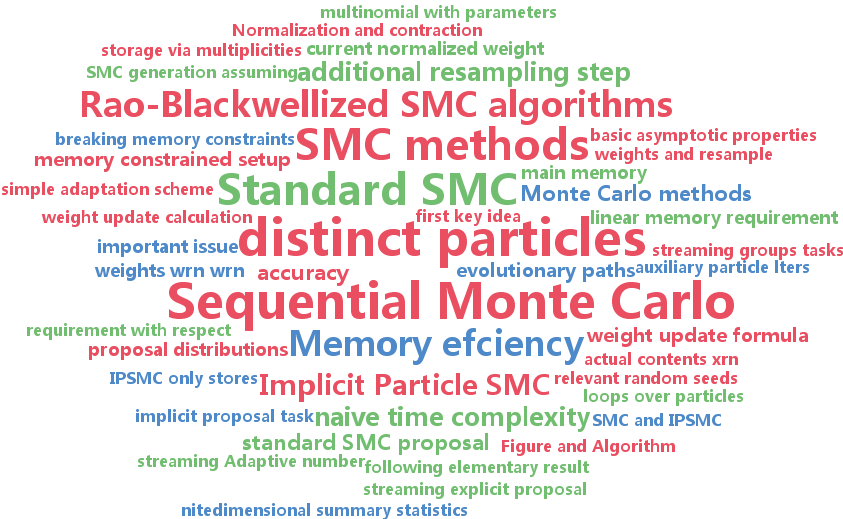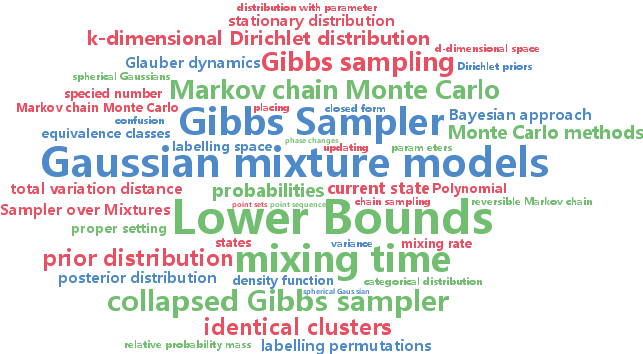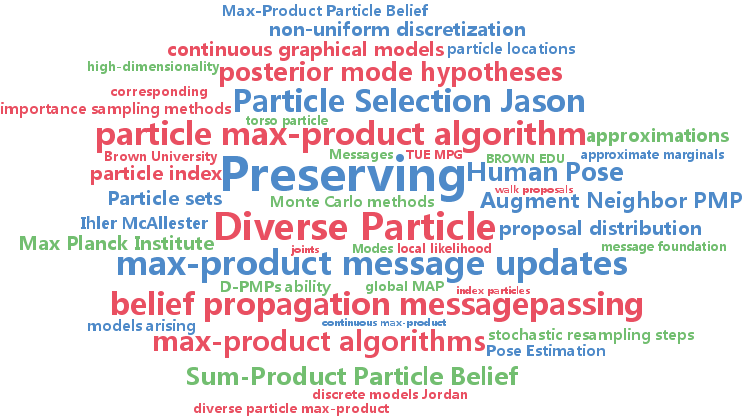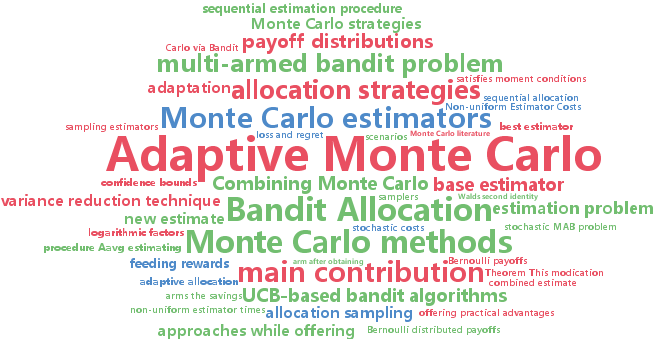monte carlo methods
-
Seong-Hwan Jun and Alexandre Bouchard-Côté
Memory (and Time) Efficient Sequential Monte Carlo (pdf)
Memory efficiency is an important issue in Sequential Monte Carlo (SMC) algorithms, arising for example in inference of high-dimensional latent variables via Rao-Blackwellized SMC algorithms, where the size of individual particles combined with the required number of particles can stress the main memory. Standard SMC methods have a memory requirement that scales linearly in the number of particles present at all stage of the algorithm. Our contribution is a simple scheme that makes the memory cost of SMC methods depends on the number of distinct particles that survive resampling. We show that this difference has a large empirical impact on the quality of the approximation in realistic scenarios, and also---since memory access is generally slow---on the running time. The method is based on a two pass generation of the particles, which are represented implicitly in the first pass. We parameterize the accuracy of our algorithm with a memory budget rather than with a fixed number of particles. Our algorithm adaptively selects an optimal number of particle to exploit this fixed memory budget. We show that this adaptation does not interfere with the usual consistency guarantees that come with SMC algorithms.
-
Monir Hajiaghayi and Bonnie Kirkpatrick and Liangliang Wang and Alexandre Bouchard-Côté
Efficient Continuous-Time Markov Chain Estimation (pdf)
Many problems of practical interest rely on Continuous-time Markov chains~(CTMCs) defined over combinatorial state spaces, rendering the computation of transition probabilities, and hence probabilistic inference, difficult or impossible with existing methods. For problems with countably infinite states, where classical methods such as matrix exponentiation are not applicable, the main alternative has been particle Markov chain Monte Carlo methods imputing both the holding times and sequences of visited states. We propose a particle-based Monte Carlo approach where the holding times are marginalized analytically. We demonstrate that in a range of realistic inferential setups, our scheme dramatically reduces the variance of the Monte Carlo approximation and yields more accurate parameter posterior approximations given a fixed computational budget. These experiments are performed on both synthetic and real datasets, drawing from two important examples of CTMCs having combinatorial state spaces: string-valued mutation models in phylogenetics and nucleic acid folding pathways.
-
Christopher Tosh and Sanjoy Dasgupta
Lower Bounds for the Gibbs Sampler over Mixtures of Gaussians (pdf)
The mixing time of a Markov chain is the minimum time $t$ necessary for the total variation distance between the distribution of the Markov chain's current state $X_t$ and its stationary distribution to fall below some $\epsilon > 0$. In this paper, we present lower bounds for the mixing time of the Gibbs sampler over Gaussian mixture models with Dirichlet priors.
-
Jason Pacheco and Silvia Zuffi and Michael Black and Erik Sudderth
Preserving Modes and Messages via Diverse Particle Selection (pdf)
In applications of graphical models arising in domains such as computer vision and signal processing, we often seek the most likely configurations of high-dimensional, continuous variables. We develop a particle-based max-product algorithm which maintains a diverse set of posterior mode hypotheses, and is robust to initialization. At each iteration, the set of hypotheses at each node is augmented via stochastic proposals, and then reduced via an efficient selection algorithm. The integer program underlying our optimization-based particle selection minimizes errors in subsequent max-product message updates. This objective automatically encourages diversity in the maintained hypotheses, without requiring tuning of application-specific distances among hypotheses. By avoiding the stochastic resampling steps underlying particle sum-product algorithms, we also avoid common degeneracies where particles collapse onto a single hypothesis. Our approach significantly outperforms previous particle-based algorithms in experiments focusing on the estimation of human pose from single images. \end{abstract
-
James Neufeld and Andras Gyorgy and Csaba Szepesvari and Dale Schuurmans
Adaptive Monte Carlo via Bandit Allocation (pdf)
We consider the problem of sequentially choosing between a set of unbiased Monte Carlo estimators to minimize the mean-squared-error (MSE) of a final combined estimate. By reducing this task to a stochastic multi-armed bandit problem, we show that well developed allocation strategies can be used to achieve an MSE that approaches that of the best estimator chosen in retrospect. We then extend these developments to a scenario where alternative estimators have different, possibly stochastic, costs. The outcome is a new set of adaptive Monte Carlo strategies that provide stronger guarantees than previous approaches while offering practical advantages.




